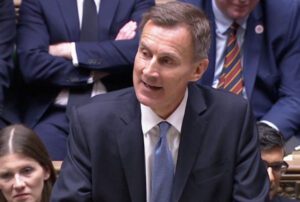<?xml encoding=”utf-8″ ?????????>
The UK government’s borrowing exceeded expectations by £6.6 billion over the past year, raising concerns about Chancellor Jeremy Hunt’s ability to implement significant tax cuts ahead of an anticipated general election.
Official figures from the Office for National Statistics (ONS) revealed that the deficit reached £11.9 billion in March, highlighting the challenge of managing public finances amidst economic uncertainties.
March’s borrowing figure surpassed analysts’ predictions, emphasizing the pressure on government finances. The ONS estimated the financial borrowing for the 2023-24 fiscal year at £120.7 billion, exceeding the Office for Budget Responsibility’s projection of £114.1 billion. This discrepancy indicates limited room for tax cuts without further straining public finances.
The Treasury attributed the rise in debt to various factors, including pandemic-related spending and energy price shocks. While acknowledging the need to control debt, the government emphasized its commitment to fiscal discipline amid economic fluctuations.
Chancellor Hunt reportedly aims to reduce national insurance for the third time before a potential autumn election, intending to bolster Conservative party support. However, economists caution against unsustainable fiscal policies, noting the limited fiscal headroom and heightened market expectations for interest rate adjustments by the Bank of England.
Despite borrowing overshooting forecasts, some analysts anticipate tax cuts ahead of a general election, driven by political considerations. However, others emphasize the need for prudent fiscal management amidst economic uncertainties and rising debt levels.
Overall, the borrowing overshoot raises doubts about the feasibility of significant tax cuts and underscores the challenges facing the government in navigating fiscal policy amidst economic volatility.
